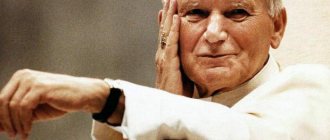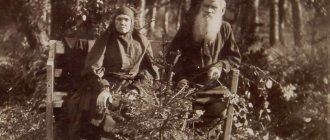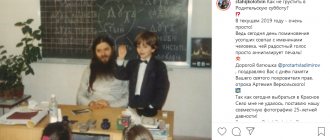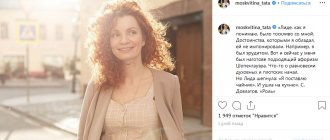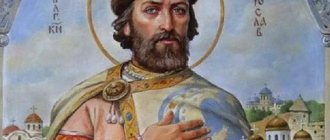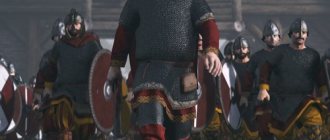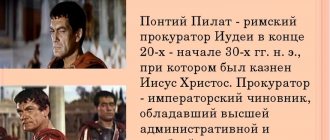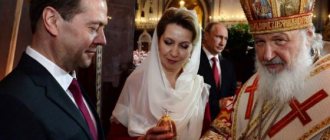| Vladimir Legoyda |
Vladimir Romanovich Legoyda
(born 1973), Chairman of the Synodal Department for Relations between the Church and Society and the Media of the Russian Orthodox Church, Acting Head of the Press Service of the Patriarch of Moscow and All Russia, Member of the Inter-Council Presence and the Supreme Church Council of the Russian Orthodox Church, Editor-in-Chief of the Orthodox magazine "Foma", Chairman of the Board of the Foundation for Assistance to the Development of Cultural and Educational Activities "Foma Center". Born on August 8, 1973 in the city of Kustanai, Kazakh SSR, in the family of an employee of the Ministry of Internal Affairs and a teacher.
In 1990 he graduated from Kostanay secondary school No. 10 with a gold medal.
In 1996 he graduated with honors from the Moscow State Institute of International Relations (University) of the Ministry of Foreign Affairs of Russia, Faculty of International Information.
In 1996, he became one of the founders and editor-in-chief of the Orthodox magazine Thomas.
From 1996 to 2007 he was a teacher, then a senior lecturer and associate professor at the Department of World Literature and Culture at MGIMO (U) of the Russian Foreign Ministry.
In 2000, he defended his dissertation for the academic degree of Candidate of Political Sciences.
Since 2004 - Chairman of the Board of the Foundation for Assistance to the Development of Cultural and Educational Activities "Foma Center".
In 2005, by decision of the Higher Attestation Commission, he was awarded the academic title of associate professor.
Since 2005 - member of the Board of Trustees of the St. Seraphim of Sarov Charitable Foundation.
From 2007 to May 2009 - Head of the Department of International Journalism at MGIMO; Executive Director of the Educational and Research Institute. Professor of the Department of International Journalism at MGIMO (U) Ministry of Foreign Affairs of Russia.
Since February 10, 2009 - member of the Council under the President of the Russian Federation for promoting the development of civil society institutions and human rights [1].
On March 31, 2009, he was appointed chairman of the newly formed Synodal Information Department of the Russian Orthodox Church (the first case in the history of the Russian Orthodox Church of appointing a layman to the post of head of the Synodal Department). [2]
Since July 27 of the same year - a member of the Inter-Council Presence of the Russian Orthodox Church.
On March 22, 2011, he became a member of the newly formed Supreme Church Council of the Russian Orthodox Church [3] ex officio.
On December 24, 2015, he was appointed chairman of the newly formed Synodal Department for Relations of the Church with Society and the Media of the Russian Orthodox Church, which on that day, in order to optimize work and increase efficiency, as well as eliminate parallel processes in the activities of synodal institutions, was created by merging the Synodal Department for Relations of the Church and society and the Synodal Information Department [4].
On January 15, 2021, he was included in the membership of the Council for Interaction with Religious Associations under the President of the Russian Federation [5].
Member of the Commission on International Relations of the World Council of Churches (from the Russian Orthodox Church).
Member of the editorial board of the magazine "Alpha and Omega".
Since March 11, 2021, he became the author of the “Parsuna” program on the Orthodox TV channel “Spas” [6].
On September 11, 2021, he was appointed acting head of the Press Service of the Patriarch of Moscow and All Rus' [7].
Married, has two daughters and a son.
A starting point
Vladimir Legoyda heads one of the important structures of the Moscow Patriarchate.
This department was established to regulate the relationship of the church with public organizations and the media. To imagine the range of tasks and problems that have to be solved and resolved, specialists need to have a specialized education, have an open mind and flexible intelligence. Historians, philosophers, cultural experts, journalists and religious scholars work under Legoyda’s leadership. The biography notes that Legoyda was born on August 8, 1973. The family lived at that time in Kustanay. The head of the family served in the police, and the mother worked as a school teacher. The child grew up collected and purposeful. After school, which Vladimir graduated with a gold medal, he entered the famous MGIMO Department of International Information. At the institute he diligently studied science and, as expected, received a diploma with honors. After completing his studies, he worked abroad for several years in various structures of the Ministry of Foreign Affairs.
Be a father! Vladimir Legoyda
Estimated reading time: less than a minute.
He was born into the family of a policeman and a teacher in the small Kazakh town of Kustanai. He loved to play football, studied well, read a lot and at the same time knew how to find a common language with school bullies. No one could have imagined that this ordinary boy would grow into a man who would be responsible - neither more nor less - for the entire information policy of the Russian Orthodox Church. His working day is scheduled minute by minute and lasts from early morning until late evening. And at home there are three wonderful children. Chairman of the Synodal Department for Relations of the Church with Society and the Media, editor-in-chief of the magazine “Thomas” Vladimir Legoyda spoke in an interview with the magazine “Batya” about his childhood, about the lessons learned from his father, and about the awareness of his own fatherhood.
— Did you grow up in a friendly family?
- Yes. Parents for me are such an unconditional example of love. My parents dreamed of children, babysat their friends’ children, but they themselves lived without children for 16 years. And this did not shake their relationship in any way. Now dad is 82 years old, mom is still 18, and they treat each other very touchingly. This does not mean that we had some kind of unrealistically ideal family. Anything happened: difficulties, quarrels, etc., but we lived in an atmosphere of love.
Parents of Vladimir Legoyda. Photo from personal archive
– Probably, like in many other families, your mother was mainly involved in raising you?
- Basically, yes. And dad... Dad was such a fantastic communicator. He took me with him in the car, I traveled with him a lot on various matters and saw how he communicated. Maybe that's where I get the basics of diplomatic communication skills.
– Your father worked in the police. What is it like when your dad is a policeman? Have you dreamed of following in his footsteps?
– I wanted to become a scout more. That's pretty much what happened. (Laughs). And I was proud of my father, not because he was a policeman, but because my dad was something special. Well... there was always some kind of holiday with him. We’ll go somewhere: skiing, to see off the Russian winter, on horses and sleighs... He’s a hunter and fisherman, he could bring something interesting from the forest.
-You have a younger sister. Perhaps you had to take care of her?
– We have a family joke: I say about my sister that this is the person who deprived me of my childhood. In one year I became an “adult” because my mother was pregnant, and all my “I want to be in my arms” had to be put aside. But I don’t remember having to take much care of my sister when she was born.
Vladimir Legoyda with his sister. Photo from personal archive
But we had this rule: she is younger, she is a girl, which means she is forgiven more.
– Did this shape your attitude towards women in the future?
– The attitude towards women was formed from what I saw around – from my parents, from their friends. Mom and dad were born before the war, grew up in a village in Ukraine, were brought up surrounded by pre-revolutionary people, among whom there was respect for age, for tradition, for the age-old way of life. We saw all this as children.
– Is there some secret, some rule, perhaps, that helps keep the family strong?
- There is only one secret here - love. Another thing is that this is such an unclassified secret. Besides the best thing that has ever been written by man about love, namely the words of the Apostle Paul from the First Epistle to the Corinthians that love “is long-suffering, kind, and does not seek its own...”, I like one more phrase from Prishvin. I read it back in school: “Love is an unknown country, and we all sail there each on our own ship, and each of us is the captain of our own ship and leads the ship in our own way.” Of course, if we take a closer look at the metaphor, we can say that in general there is a principle of the movement of ships. But I believe that love excludes all algorithms. How many friends I have, they have so many stories, how they met, how they realized that this was their person, how they live.
– How did you understand that this was your person?
- Somehow very quickly. Nastya wrote for the magazine “Foma” for three years, I knew that we had such an author, but we had never met. One day, I was just walking through the editorial office, I saw a girl sitting, typing. I asked my colleague and friend who it was. He was surprised: “This is Nastya Verina, don’t you know something?” I immediately invited her to urgently “discuss the material.”
Wedding. Photo from personal archive
– Has your wife not worked since the birth of her eldest daughter? What is it like for her to stay at home?
– How can mother’s worries be called “sitting”? I think it’s not easy for her, but it’s not the kind of severity that leads to conversations like “oh, I’m deteriorating, I urgently need to go to work!” Firstly, she has no time to be bored, and secondly, it’s really interesting with these, as I call them, “three little pigs”. And thirdly, she reads, sometimes writes herself, she has a circle of her own interests and friends.
Vladimir Legoyda with his wife Anastasia. Photo from personal archive
“It turns out that over the years of parenthood, little has changed for her, only there are more children. But you just had serious changes: you were the head of the department and the editor-in-chief of the magazine - you became the Chairman of the Synodal Department. How has this affected your fatherhood?
- Well, how did it influence? When she was little, I often bathed the eldest Lisa myself. Middle Anka - only a few times, and Roma - almost never. Because Lisa was born before the changes at work, in a past life.
– So, the main difference is the lack of time?
– Of course, there is less time, but that’s not even the point. When I was appointed, I talked with His Holiness the Patriarch, consulted, and he said that we must do our work “with the understanding of high responsibility for every word spoken.” Of course, you never need to just wag your tongue, and the gospel principle says that a person will give an answer for every idle word. But we understand that there are different levels of responsibility. And when any of your words can be interpreted as the position of the Church, then you will think ten times about how to formulate this or that phrase.
Vladimir Legoyda and Patriarch of Moscow and All Rus' Kirill
– Did it turn out that your professional activity took you away from your family?
– You know, this is a general question: what is more important – family or work? I think this is the wrong question - they cannot be compared, weighed on the same scales. Family is life. Work is work, service.
I have been lucky in my life: I have never done anything that is not interesting to me. I know that some people search for themselves until they are 40, some – all their lives. I didn't have that. After graduating from college, I formed a clear position: I want to teach. And I stayed to teach. I loved making the magazine. I still work in a profession that interests me. This is not my merit, it is such a gift from Heaven that I don’t have a job where “dad just makes money.” And this is also important for the family, it creates a certain atmosphere.
– Do you have time to communicate with children?
– Once in one clever book or article about education, I read that in general it is not how much time you spend with children that matters, but how you spend it. So I stopped worrying about the number of hours.
Vladimir Legoyda's wife Anastasia and his children Lisa, Anya and Roma. Photo from personal archive
– Do you remember the moment when you felt like a father?
- I remember. Nastya went to my parents out of town, and there she started having contractions. I rushed from Moscow to the maternity hospital. They even let me into my wife’s room and showed me Lisa. I saw such a lump with tubes lying under the hood - and at the same time I felt how familiar it was...
The doctor on duty stood nearby, spoke a lot of clever and incomprehensible words, like an excellent student on an exam, and, as it seemed to me, convinced me that everything was not very scary. Therefore, the next day I came absolutely calm. And then they tell me: “The child is in intensive care.” I didn’t even give it due importance at first. I ask: “Doctor, when can we take our daughter home?” This probably sounded very frivolous, because the doctor answered me rather sharply: “Do you see what is written here? Resuscitation! And then it became truly scary for this small and even stranger person.
– What supported you at that moment?
“One wonderful priest, a family friend, told me then: “Don’t worry so much.” I say: “What if something happens?” And he answered me: “Well, from the point of view of salvation, her chances are higher than yours.” Some may consider this a very harsh, scary phrase - that’s how I reacted at first. But since it was not a stranger who said this, I realized that it was correct. What kind of Christian am I if I don’t believe?
– Are you scared for the children in general?
- Yes very. But I’m scared mainly because of what I see in the older generation, in my students at the institute, because of what I hear about school. Although this is probably not entirely correct. When Anya was baptized, Abbot Damascene (Orlovsky) said: how children will grow up depends only on their parents. If children see Christian parents, then they will have a chance to grow up as Christians. It seems like a truism, but he said it so seriously that I thought about it and said: “Father, this is very difficult.” He nodded: “But it’s saving and gracious.”
– How do you, a teacher, assess the situation in Russian education, the Unified State Examination and so on?
– I am extremely skeptical about modern schools, although there are still good schools and excellent teachers. But everything that happens in education increases the burden on the family.
Vladimir Legoyda with MGIMO students
– What should the family do?
– Once upon a time, a long time ago, I read in some book that parents make a standard mistake by asking their children the question: “What grade did you get today?” The right question is: “What did you learn today?” But if earlier the wrong question did not lead to fatal consequences, because there was a desire for knowledge in society, then today a lot depends on how you orient the child.
– How do you guide your children?
– For example, Lisa and I “walk at a fast pace” - that’s what we call it. Anya and Roma are still small, they can’t keep up with my steps, but Liza is already big, she can. And I say: “Well, let’s go for a walk.” And we walk and talk.
My children and I also teach the capitals of states. I made flashcards and we remember them in a playful way. They may not fully understand what a state is, but Beijing will always respond to China and name what country Tegucigalpa is in. This, too, may be a test approach... I don’t know how to do it, how to do it correctly, but I’m trying to follow their development.
– Do you play with children?
“I’m trying to fool around with the kids somehow.” I remember my sister and I asked our dad as children: “Dad, be little!” And he started waving his arms and legs, shouting: aaaah! This made us laugh a lot. I'm probably more strict. Maybe this teaching element is turning on in me.
Recently I woke up in the morning, the children ran into the room, and Lisa said that dad would be a tree, and they would be a “herd of boa constrictors” that would crawl onto the branches and hang and swing on them. I said that I didn’t want to be a tree, that I didn’t like it. But Lisa reasoned: “Dad, trees don’t talk! You can only move your leafy fingers, but not very quickly.”
Vladimir Legoyda with his daughter Anya. Photo from personal archive
– What future do you dream about for your children? Who would you like them to be?
“I read a children’s book about Ksenia of Petersburg to Anechka recently, and she said: “I want to be like that. Saint Anne" (smiles).
Of course, I think about their future. I would like them, like me, to be lucky enough to do what they like, without internal conflict, without the factor of having to earn money at a job they don’t like. Then I would be happy.
Like everyone else, I consider the professions of a doctor and a teacher to be very noble. But it’s wrong to dream about such things. In the film based on the story “The Jester” by Yuri Pavlovich Vyazemsky, the hero says: “I am a teacher by vocation, and she is by misunderstanding.” I don't want them to become anything by misunderstanding.
– Nowadays children are small, they mainly draw knowledge about the world from you. But later in life they will encounter different things...
“Now is the most important time for my children, when you can teach them by example, explain something, using your authority. Because when they reach the age of high school, they will have other authorities, what they will be, we don’t know. I still think about this with trepidation.
I recently spoke with one of my friends, who already has an adult daughter. He said: “It is clear that, like all children, she went through different periods. But I had one goal - to always be there. We never had this: “How could you?!” She knew that no matter what happened, she could come to dad.” This does not mean that he liked everything and agreed with everything. But in all situations he remained close to his daughter.
The goal is clear, but God knows how to achieve it. This is not like “drink oatmeal and your stomach will be healthy.” Even such algorithms do not always work. But here everything is more complicated. These are such fragile relationships that have developed and will somehow continue to develop. Time will tell how.
Vladimir Legoyda with his daughters. Photo from personal archive
Interviewed by Alexandra Obolonkova.
This interview is part of the “Being a Father!” project, implemented by the online magazine “Batya”, the St. Andrew the First-Called Foundation and the Nikeya publishing house. You can read the full version of the interview in the book, which will be published in 2021.
Scientific and educational activities
Legoyda defended his Ph.D. thesis in 2000. The scientist purposefully chose the topic “Symbols and rituals in US political processes.” He saw how the political establishment lives overseas and what techniques Russian politicians adopt. Even with a superficial analysis, one can classify the current situation using a figurative popular expression: as for the peasants, so for the monkey. Within the framework of globalization, such an approach is quite acceptable and even justified.
Regular cooperation with the structures of the Orthodox Church began in 2006. Vladimir Romanovich was invited to participate in the development of the foundations of the doctrine of dignity, freedom and human rights in the Orthodox interpretation. Legoida's scientific and educational career developed successfully. For two years he headed the journalism department at his native institute. In 2010, the scientist was approved as a member of the Council for Culture under the Patriarch. A year later he becomes a member of the academic council of the Orthodox gymnasium in Moscow.
amoralism
Vladimir Legoyda conducts a polemic against the commandments, considering morality possible only in human society: a person on a desert island cannot be moral. Sin is also “not a moral concept”:
Imagine a person on a desert island: he does not need to be moral; in principle, he cannot commit immoral acts. But he can still have a relationship with God... The commandments have never, at least in Christianity, been the goal. Including because sin is not a moral category in Christianity, but an ontological one[16].
Vladimir Legoyda assesses abortion this way:
Abortion is murder, this is an unambiguous, definite position of the Church, but this does not mean that we need to shoot and bring to justice those who committed it[17].
Since 2011, Vladimir Legoida has been cooperating with the state in abortion policy:
We will firmly outline our position, but at the same time, we will work with both the Duma and the Ministry of Social Health Development so that there is less of this sin in our lives[18].
In 2015, in connection with the issue of removing abortion from the compulsory health insurance system, he stated:
First of all, I would like to emphasize that the initiative regarding abortion put forward by the Russian Orthodox Church was not fully adequately reflected in a number of media outlets. In them, the position of the Church was presented in such a way that it supposedly advocates an immediate and complete ban on abortion. This is not true[19].
Essays on personal life
The versatile creativity of Vladimir Legoyda brings worthy results. He, following the highest commandments, continues to sow what is reasonable, good, and eternal. With his active participation, the cultural and educational magazine “Foma” was founded and published. Legoyda, despite his heavy workload, remains the editor-in-chief of the publication. In 2018, he began hosting his own program on the Spas TV channel.
Little is known about Vladimir Romanovich’s personal life, although he makes no secret of it. Legoyda is married. Husband and wife united their destinies in early youth. They raised and raised three children. An atmosphere of love and mutual respect reigns in the couple's home.
Content
- 1 education
- 2 church positions
- 3 ecumenism
- 4 press
- 5 organizations
- 6 ideology 6.1 propaganda
- 8.1 rock opera "Jesus Christ Superstar"
- 12.1 books
events
- Give soul to Europe. Mission and Responsibility of the Churches (conference) (May 3, 2006)
- Meeting of the Central Committee of the WCC, 2006 (August 30, 2006)
- XII World Russian People's Council (February 20, 2008)
- Globalization, religion, traditional values (summit) (April 27, 2010)
- IV All-Church Congress of Diocesan Missionaries of the Russian Orthodox Church (November 16, 2010)
- XV World Russian People's Council (May 25, 2011)
- IV Congress of Leaders of World and Traditional Religions (May 28, 2012)
- XIX World Russian People's Council (November 10, 2015)
- Meeting of the working group of representatives of the Russian Orthodox Church and the Roman Catholic Church of Italy (February 21, 2017)
- XXI World Russian People's Council (November 1, 2017)
- Orthodoxy: yesterday, today, tomorrow - 2021 (forum) (August 23, 2018)
- II Baku Summit of World Religious Leaders (November 14, 2019)
- International conference “Christian values in the modern world” (November 28, 2019)
Mass culture
Vladimir Legoida does not see any boundaries between secular culture and the Church:
The pair “Church” and “culture” are not two horizontally located identical institutions that should interact like one ministry with another. No, it's all part of society. Many people of culture are believers, they are also the church. After all, what is a church? A church is a collection of believers. Therefore, any work created by a person who considers himself a Christian also has a relationship to both culture and the church[20].
From the point of view of Vladimir Legoyda, “The Church is inseparable from society,” and specifically from a secularized, secular religious society:
In the European cultural context, sport, like science and public administration, has become secularized over time, and the Church can only welcome this. We don’t make sacrifices to presidents (and we did make sacrifices to emperors), we don’t perform magic on test tubes (the philosopher’s stone is a thing of the past), and we don’t dedicate sports to Zeus. This is a solid and unshakable foundation of European civilization”[21].
rock opera "Jesus Christ Superstar"
On November 1, 2021, Vladimir Legoyda expressed disagreement with members of the public who in some regions advocated banning the rock opera “Jesus Christ Superstar”: “The Church does not suppress creativity, blessing artists who are inspired by gospel stories in their works.” Commenting on the appeal of Tyumen residents to Governor Vladimir Yakushev with a request to cancel the showing of the mentioned rock opera, V. Legoyda called for seeing the difference between the non-canonical and blasphemous depiction of the shrine and reported the fantastic fact that the mentioned rock opera allegedly “brought many to the Church”[22].
In 2012, Vladimir Legoida spoke out against the ban on the blasphemous rock opera “Jesus Christ Superstar”: “I do not support the initiative of the anonymous Rostov Orthodox community to ban the rock opera”[23].
After performances by Vladimir Legoyda, rock missionaries and representatives of the Rostov Metropolitanate at the Rostov Regional Philharmonic, ticket sales were resumed for the blasphemous rock opera “Jesus Christ Superstar”[24].
In 2011, V. Legoyda’s magazine “Foma” celebrated the 40th anniversary of the premiere of the rock opera. A. Belov from the rock group “Gorky Park” then wrote: “I simply cannot believe that such beautiful music was written out of blasphemous motives, out of a desire to mock someone else’s faith. This is, rather, a sincere delusion of the authors who strived for good as they understood it”[23].
"Vangelia"
In 2013, Vladimir Legoida supported Channel One in connection with the broadcast of the series “Vangelia” about the Bulgarian false prophetess Vanga:
Many representatives of the Orthodox community put forward unreasonable demands on the federal channel, which is not Orthodox. It even goes so far as to insult the management of the TV channel. Such actions cannot be called Christian”[25].
According to Legoyda, “The Bulgarian clairvoyant Vanga is perceived in the Bulgarian and Russian Orthodox churches as a victim of the action of dark forces.” Legoyda considers the propaganda of these actions of dark forces to be excusable, since “in recent years, Channel One has begun to show reports from church holidays and other church events many times more often, cover the visits of Patriarch Kirill and quote his sermons”[25].
Another argument in favor of the channel was the charity marathon “The Whole World”, recently organized through the efforts of the management of Channel One: “Why do we forget about the good deeds of people when we are overcome by a passionate desire to condemn?” [25].
awards
- Order of St. Seraphim of Sarov, III degree (Russian Orthodox Church, 2006)[26].
- Order of St. Sergius of Radonezh, III degree (Russian Orthodox Church, 2008)[27]
- Badge “Good Shepherd” (Synodal Department for Youth Affairs of the Russian Orthodox Church).
- Golden Cross of the Apostle Paul, III degree (Greek Orthodox Church, 2013)[28]
- Badge of honor in memory of Alexei Afanasyevich Dmitrievsky (Imperial Orthodox Palestine Society).
- Order of Saint Sava, III degree (2014, Serbian Orthodox Church)[29]
essays
books
- Legoyda V. R.
Declaration of dependency. - M.: Nikeya, 2011. - 192 p. - Legoyda V.R.
Do jeans interfere with salvation?
Experience of modern apologetics. - 3rd, correct. and additional.. - M.: Foma-Center, Dar, 2007. - 384 p. Legoyda V.R.
Do jeans interfere with salvation? Experience of modern apologetics. - 1st. - M.: Foma-Center, 2005. - Legoyda V.R.
Do jeans interfere with salvation? Experience of modern apologetics. - 2nd. - M.: Foma-Center, 2006.
Man in the Skin of a Dragon. - M.: Nikeya, 2015. - 208 p.
A few words for the Nativity of Christ. - M.: Nikea, 2021. - 48 p.
The Church Raising Its Voice. - M.: Eksmo, 2021. - 192 p. - (Orthodox Library). — ISBN 978-5-04-091178-3.
articles and interviews
- Legoyda V.R.
About earthly and heavenly citizenship. // Church and society. - 1998. - No. 3. - Legoyda V.R.
The main danger of our time. // Pro et contra. — 1998. - Legoyda V. R.
“Civil religion” in the USA: genesis and main characteristics // State, religion, church in Russia and abroad. Information and analytical bulletin of RAGS. - 1999. - No. 4. - Legoyda V.R.
“The American Dream” and US foreign policy. // Export of weapons. - 1999. - No. 6. - Legoida V. R.
Religiosity in a non-religious society. Article 1-3. // Alpha and Omega. - 2000. - No. 1, 2, 4. - Legoida V. R.
The image of the president in American political culture. // Mass communications and mass consciousness. Digest of articles. M.: MGIMO, 2001 - Legoyda V. R.
Religious discourse in modern media: is it possible to talk about Christianity in the era of secularism. // Church and time. - 2006. - No. 35. - Legoyda V. R.
Politics and the salvation of the soul. // Foma. - 2008. - No. 1 (57). - Legoyda V. R.
Church and culture: tradition and conservatism. // Alpha and Omega, 2009, No. 54 (1); - Legoida V. R.
New information about human rights. // Alpha and Omega. — 2009. No. 55 (2). - Legoyda V. R.
Faith as cultural identity and faith as life. // Foma. — 2008. — June. - Legoyda V. R.
What was, what is. //Alpha and Omega. - 2010. - No. 1 (57). - Legoyda V.R.
Freud never dreamed of it. // News. — 2011. — April 14. - Legoyda V. R.
Unified State Examination as a large-scale moral problem. // News. — 2012. — June 13. - Legoyda V. R.
The world of utopias, or once again about the Church and the state. // www.expert.ru. — 2012. — October 8. - Legoyda V.R.
About children - without politics and selfishness. // www.expert.ru. — 2012. — December 21. - Legoyda V.R.
The church does not merge with the state, but defends its rights. // Arguments and Facts. — 2013. — January 11. - Legoyda V. R.
People are important, not numbers. // Capitalism. — 2013. — February 12. - Legoyda V.R.
Feelings of believers and non-believers, or why you should not go with your charter to someone else’s monastery. // Independent newspaper. — 2013. — May 14.
appearances on radio and television
- “Channel 3” // Program “Triangle”. — 2011. — January 6.
- Radio station “Mayak” // Program “Propaganda”. — 2012. — February 15.
- T/k "Rain" // "The Church intervened in the national question." — 2011. — August 25.
- T/k Russia 1 // Program “Special Correspondent” // “Provocateurs”. - 2012. - April 24; "Provocateurs 2". - 2012. - September 11.
- Radio station “Echo of Moscow” // Program “Parents’ meeting” // “Church and school: points of contact.” — 2012. — November 18.
- T/k "Rain" // Sobchak live. — 2013. — February 7.
- T/k “Russia 24 // Program “Senate” // “Is it necessary to protect the feelings of believers?” — 2013. — April 17.
- Public television of Russia // Program “Without Prefaces”. — 2013. — June 25.
- World of Belogorye // Program “Path, Truth and Life”. — 2015. — May 5. [[1]]
